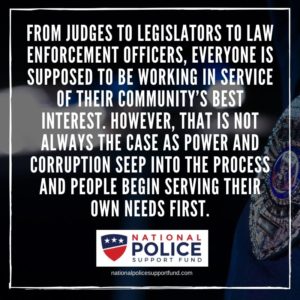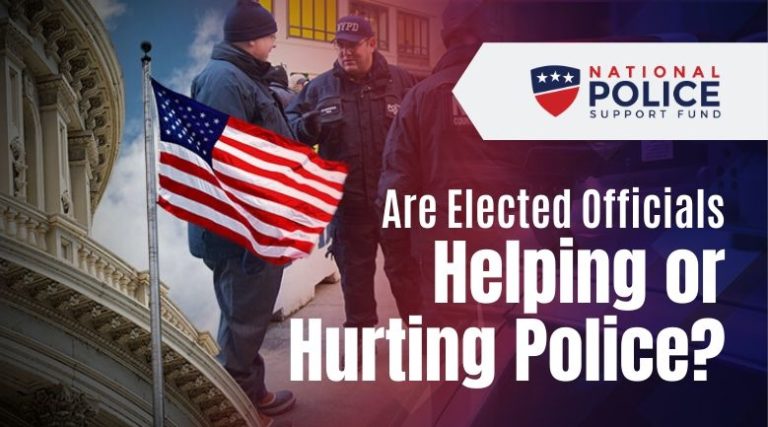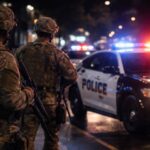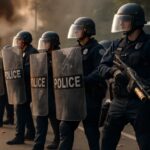From judges to legislators to law enforcement officers, everyone is supposed to be working in service of their community’s best interest. However, that is not always the case as power and corruption seep into the process and people begin serving their own needs first.
In the case of police, the consequences of these choices by politicians and court officials can literally be an issue of life or death. When police officers do not have the support of judges and lawmakers, they can’t properly do their job of keeping the community safe.
Let’s dive into the complicated relationship between police, politicians, and judges to explore how each group works with — and sometimes against — one another.
Public Support vs. Political Actions
One incentive for elected officials to work with their local police force is that support for police remains strong among the public, with more than 50% of the public saying they have confidence in the police as an institution, according to a recent Gallup poll.
The same poll found that only 23% of Americans have confidence in the criminal justice system, and just 11% have confidence in Congress. It’s clear that these organizations could benefit from working with the police to re-establish their own trust with the public.
Given the disparity in public conflict among organizations, as we’ve discussed before there are several ways that judges and politicians have worked to undermine the important work police officers do:
In Minneapolis, late-night crime is up 53% because of a police shortage and the City Council’s failure to make law enforcement a priority in the city. The city’s Police Chief says the number of officers has not kept pace with the city’s rapidly-growing population, and the department struggles to respond to emergency calls.
A Seattle drugstore, Bartell Drugs, had to close one of its locations in the city because the cost of repeated vandalism became too high. Both the business owner and police officers blamed a police shortage for the continued robberies that led to the store’s closing.
Like in Minneapolis, the Seattle City Council seems uninterested in adding more police officers or considering how the police can help address crime in the city.
“It is extremely frustrating to constantly hear nothing but attacks and second-guessing from Seattle City Council members who frequently make accusations based on their own biases and with no regard to fact,” one officer told Seattle’s Fox Q13 News.
Bartell Drugs CEO Kathi Lentzsch echoed those comments to Seattle’s KIRO 7.
“It’s a concern. I think we’re sweeping it under the rug. The city council, the mayor, the state, the judicial system, the community — we all have to come together to figure this out,” Lentzsch said.
Problems in The Big Apple
New York City is the largest city in the United States and, for a long time, was considered to be one of the country’s most dangerous places to live. However, two decades of increased police power under Mayors Rudolph Guiliani and Michael Bloomberg led to a drastic decrease in crime and an increased feeling of safety across the city.
Now, however, the tides appear to be turning back in the other direction under the administration of Mayor Bill De Blasio. Writing in the New York Post, retired NYPD Lieutenant Rick Khalaf said the mayor and city council have discouraged police officers from making arrests and focused on punishing officers who make mistakes.
The result, he says, is a city that no longer feels safe for many to call home.

The problem is exacerbated by giving criminals the ability to file complaints with the Civilian Complaint Review Board, which is known for being politicized and hostile toward police. The NYPD does not want to field complaints from the board and encourages officers to focus on staying under the radar, rather than doing what’s necessary to keep the public safe.
Khalaf also cites the city’s district attorneys for refusing to bring charges against people who are arrested, particularly those that might be politically unpopular or create an unfavorable media narrative.
In addition, judges also fail to uphold the law and allow drug dealers and other repeat criminal offenders to go free. This happens far too often, and each additional time an officer has to deal with these offenders, the more dangerous the situation becomes.
These actions also have a chilling effect on the NYPD itself. Fewer people want to become officers when they know they can’t fully do their jobs because of restrictive policies or disregard for law enforcement in other areas of government.
What Next?
As we enter an election year, those seeking votes in November — whether in local, state, or national elections — will likely be looking for the support of police and the strong public trust that comes with the organization.
This presents an opportunity for police organizations around the country to be assertive in asking elected officials to give support to the police in return for the support that officers provide them in the election.
According to the Washington Post, this is already starting to happen in New York City with the appointment of a new NYPD Commissioner.
Another option is for law enforcement to become more vocal in supporting — or speaking out against — political candidates. Again, given the high amount of trust for police respective to other parts of the government, the public might just listen and vote for the elected officials who are going to support the police force that works tirelessly to keep them safe day in and day out.
James E. Miller summed up this approach in Law Enforcement Today and provides some food for thought moving forward. He writes:
Is there a strong leader in place, who supports their department in an unwavering manner? Or do the policies enacted by a weak, apologist political operative compromise the safety and security of the police community?
I never thought politics would play a role in police work, but now it does, and it could mean the difference in life and death, and certainly job satisfaction.
Law enforcement officers need to make countless life-or-death decisions every day, and public support for that work is critical. People need to feel confident that police officers have their best interests in mind as they work tirelessly to protect and serve their communities. A decline in trust and respect makes it much more difficult for officers to do their jobs. Let’s take a closer look at the issue of respect for police and why it matters now more than ever. Read more here.








